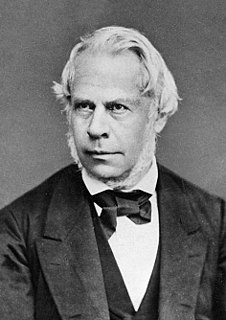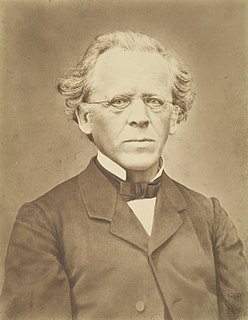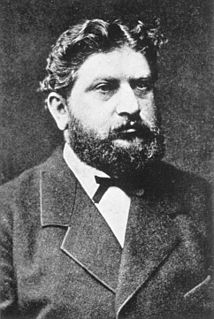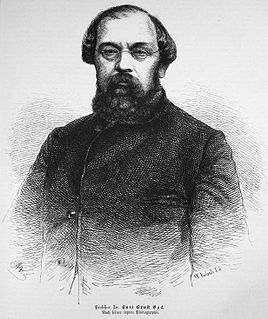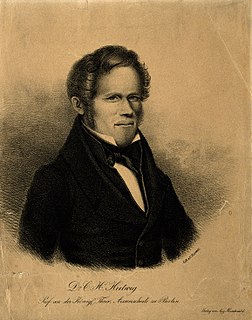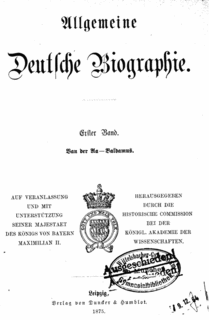
Ernst Friedrich Gurlt (October 13, 1794 – August 13, 1882) was a German veterinarian and anatomist born in Drentkau near Grünberg, Silesia. He was the father of surgeon Ernst Julius Gurlt (1825-1899).
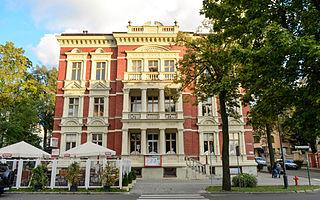
Zielona Góra(
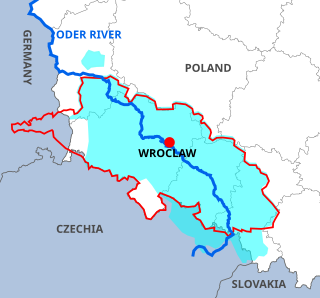
Silesia is a historical region of Central Europe located mostly in Poland, with small parts in the Czech Republic and Germany. Its area is about 40,000 km2 (15,444 sq mi), and its population about 8,000,000. Silesia is located along the Oder River. It consists of Lower Silesia and Upper Silesia.

In modern medicine, a surgeon is a physician who performs surgical operations. There are also surgeons in podiatry, dentistry maxillofacial surgeon and the veterinary fields.
Initially trained as a pharmacist, he later studied medicine and anatomy. Beginning in 1819, he taught classes at the Berlin Tierarzneischule (veterinary school), where from 1827 to 1870 he held the title of professor. In 1849 he was appointed technical director of the school.

Pharmacists, also known as chemists or druggists, are health professionals who practice in pharmacy, the field of health sciences focusing on safe and effective medication use. Pharmacists undergo university-level education to understand the biochemical mechanisms and actions of drugs, drug uses, therapeutic roles, side effects, potential drug interactions, and monitoring parameters. This is mated to anatomy, physiology, and pathophysiology. Pharmacists interpret and communicate this specialized knowledge to patients, physicians, and other health care providers.

Berlin is the capital and largest city of Germany by both area and population. Its 3,748,148 (2018) inhabitants make it the second most populous city proper of the European Union after London. The city is one of Germany's 16 federal states. It is surrounded by the state of Brandenburg, and contiguous with its capital, Potsdam. The two cities are at the center of the Berlin-Brandenburg capital region, which is, with about six million inhabitants and an area of more than 30,000 km², Germany's third-largest metropolitan region after the Rhine-Ruhr and Rhine-Main regions.
Ar Berlin, he gave lectures in normal and pathological anatomy, physiology, zoology and botany. He is remembered for his investigations of animal deformities, and during his career he amassed an impressive collection of anatomical malformations. [1] With Carl Heinrich Hertwig (1798-1881), he founded the Magazin für die gesammte Thierheilkunde (Magazine for the entirety of veterinary science).
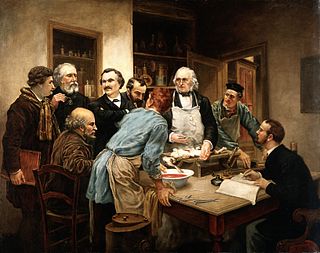
Physiology is the scientific study of the functions and mechanisms which work within a living system.
Zoology is the branch of biology that studies the animal kingdom, including the structure, embryology, evolution, classification, habits, and distribution of all animals, both living and extinct, and how they interact with their ecosystems. The term is derived from Ancient Greek ζῷον, zōion, i.e. "animal" and λόγος, logos, i.e. "knowledge, study".

Botany, also called plant science(s), plant biology or phytology, is the science of plant life and a branch of biology. A botanist, plant scientist or phytologist is a scientist who specialises in this field. The term "botany" comes from the Ancient Greek word βοτάνη (botanē) meaning "pasture", "grass", or "fodder"; βοτάνη is in turn derived from βόσκειν (boskein), "to feed" or "to graze". Traditionally, botany has also included the study of fungi and algae by mycologists and phycologists respectively, with the study of these three groups of organisms remaining within the sphere of interest of the International Botanical Congress. Nowadays, botanists study approximately 410,000 species of land plants of which some 391,000 species are vascular plants, and approximately 20,000 are bryophytes.
His name is associated with Gurltia paralysans , a parasitic nematode that infects certain felines. [2]
Gurltia paralysans is a parasite which attaches itself to the veins of South American felines

The nematodes or roundworms constitute the phylum Nematoda. They are a diverse animal phylum inhabiting a broad range of environments. Taxonomically, they are classified along with insects and other moulting animals in the clade Ecdysozoa, and unlike flatworms, have tubular digestive systems with openings at both ends.


